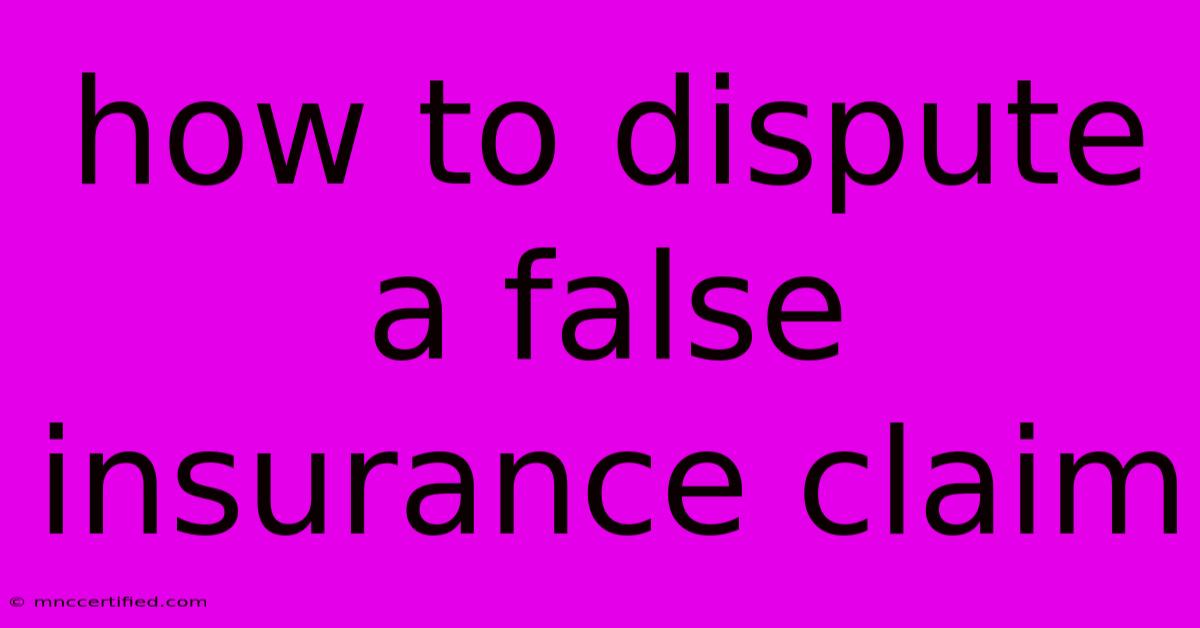How To Dispute A False Insurance Claim

Table of Contents
How to Dispute a False Insurance Claim: Protect Yourself from Unfair Accusations
Being accused of making a false insurance claim can be a stressful and confusing experience. It's crucial to understand your rights and know how to effectively dispute such claims. This guide will equip you with the knowledge and steps needed to protect yourself and your financial well-being.
Understanding False Insurance Claims
A false insurance claim occurs when someone deliberately misrepresents facts or creates a fictional incident to receive an insurance payout. This can involve exaggerating the severity of an accident, fabricating an event, or claiming damage that never occurred.
Why You Might Be Accused of a False Claim
Accusations of false claims can arise from various reasons, including:
- Disputes with insurers: You might be accused of inflating your claim to receive a larger payout.
- Fraudulent activities: In some cases, insurers might suspect you of engaging in fraudulent activities, such as staged accidents or fraudulent claims.
- Mistakes or misunderstandings: Sometimes, accusations can be due to genuine mistakes or misinterpretations of the incident.
Steps to Dispute a False Insurance Claim
1. Review the Claim Details:
- Examine the documentation: Carefully review the claim details, including the incident report, photos, and any other supporting evidence provided by the insurance company.
- Identify discrepancies: Look for any inconsistencies, inaccuracies, or missing information that could support your case.
2. Gather Evidence:
- Collect supporting documentation: Compile your own evidence, such as receipts, medical records, witness statements, or photographs, to substantiate your side of the story.
- Take photos or videos: If applicable, document the damage or the scene of the incident to support your claims.
3. Respond to the Accusation:
- Contact the insurer: Respond promptly to the insurer's accusation and explain your position.
- Provide evidence: Submit your collected evidence to the insurer, clearly explaining why the accusation is false.
- Request a review: If you feel the insurer is not taking your explanation seriously, request a review of your case by a senior representative or an independent adjuster.
4. Seek Legal Assistance:
- Consult with an attorney: If the dispute continues and you feel overwhelmed, it's advisable to consult with an attorney specializing in insurance law. They can guide you through the legal process and advocate for your rights.
- Know your state's laws: Familiarize yourself with your state's laws regarding insurance claims and disputes. This knowledge can be crucial in protecting your interests.
5. Protect Your Credit:
- Monitor your credit report: False claims can negatively impact your credit score. Monitor your credit report regularly and dispute any inaccuracies.
- Be vigilant about fraud: Take precautions to prevent identity theft and protect your personal information.
Key Points to Remember:
- Document everything: Keep detailed records of all communication, evidence, and interactions with the insurer.
- Be respectful but firm: Communicate clearly and respectfully with the insurer, but don't hesitate to advocate for your rights.
- Don't admit fault: Unless you are genuinely at fault, avoid making any statements that could be interpreted as admitting liability.
Conclusion:
Facing accusations of a false insurance claim can be a challenging ordeal. By following the steps outlined in this guide, you can effectively defend yourself and protect your financial interests. Remember, knowledge is power – equip yourself with the necessary information and take action to ensure a fair outcome.

Thank you for visiting our website wich cover about How To Dispute A False Insurance Claim. We hope the information provided has been useful to you. Feel free to contact us if you have any questions or need further assistance. See you next time and dont miss to bookmark.
Featured Posts
-
Health Insurance Digital Transformation
Nov 09, 2024
-
Commercial Truck Insurance San Antonio
Nov 09, 2024
-
Seaview Insurance Company Phone Number
Nov 09, 2024
-
Rashida Jones Remembers Father Quincy Jones
Nov 09, 2024
-
Cardiff City Vs Rovers Match Preview And Key Players
Nov 09, 2024